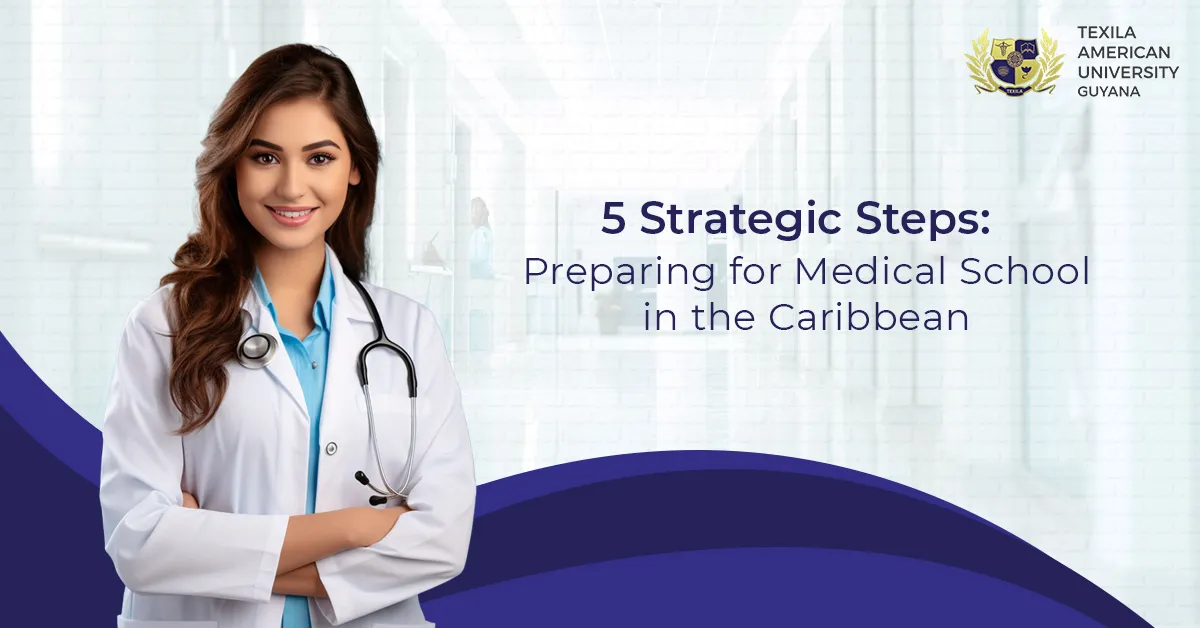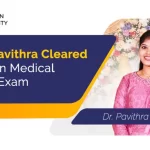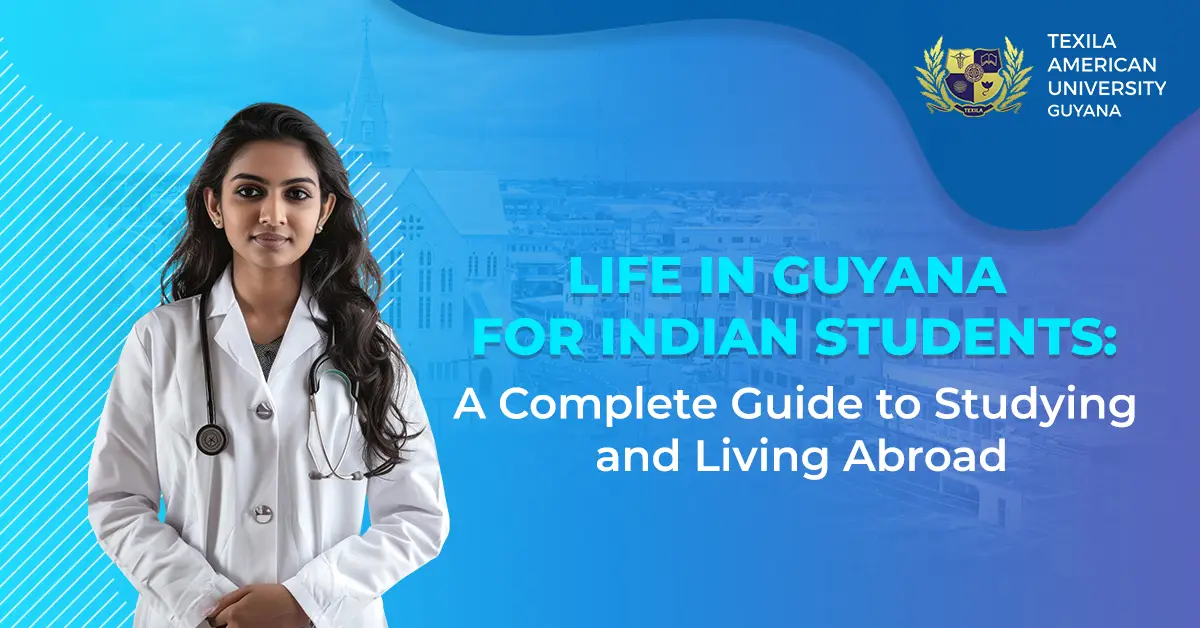Blog Summary:
Embarking on the journey to medical school in the Caribbean requires careful preparation and strategic planning. In this comprehensive guide, we’ve outlined five essential steps to help aspiring doctors navigate the application process and increase their chances of securing admission. The first step involves thorough research into Caribbean medical schools, considering factors such as accreditation, curriculum, faculty expertise, clinical rotations, and residency match rates. Understanding the admission requirements of these schools, including prerequisite courses, letters of recommendation, GPA, and MCAT scores, is crucial for success. Preparing for standardized tests like the MCAT is paramount, and developing a structured study plan with review materials, practice exams, and dedicated study sessions is essential. Gathering all required documentation, including transcripts, letters of recommendation, a comprehensive resume, and a well-crafted personal statement, is the next step in the process. Finally, navigating the application process involves careful attention to deadlines, submission instructions, and meticulous application crafting. By following these strategic steps, aspiring medical students can position themselves as competitive applicants and increase their chances of gaining admission to their preferred Caribbean medical school.
Introduction
Embarking on the journey to medical school is a thrilling yet daunting endeavor for aspiring doctors, especially those considering studying in the Caribbean. Success in this pursuit hinges on thorough preparation and a clear understanding of the steps involved. In this comprehensive guide, we’ll delve into five strategic steps to help you navigate the process of preparing for medical school in the Caribbean and enhance your chances of securing admission.
Researching Caribbean Medical Schools
Before you dive into the application process for Caribbean medical schools, it’s vital to embark on thorough research. This initial step sets the foundation for your entire journey towards medical school.
- Begin by considering various factors, such as accreditation status, which ensures that the school meets certain educational standards and requirements. Look for schools accredited by reputable accrediting bodies, as this signifies their commitment to delivering quality education.
- Next, delve into the curriculum structure of each medical school. Evaluate whether it aligns with your learning style, preferences, and career goals. Some schools may offer specialized tracks or elective courses that cater to specific interests, so it’s essential to explore these options. Faculty expertise is another critical aspect to consider. Look into the qualifications, experience, and research interests of the faculty members. A diverse and experienced faculty can provide valuable insights, mentorship, and opportunities for research and clinical experiences.
- The availability of clinical rotations is crucial for gaining hands-on experience and developing practical skills. Research whether the medical school has partnerships with reputable hospitals and healthcare facilities where you can complete clinical rotations. Additionally, inquire about the variety of clinical experiences offered and whether they align with your career interests.
- Lastly, consider residency match rates, which indicate the success of graduates in securing residency positions after graduation. Look for schools with high residency match rates, as this demonstrates their ability to prepare students for successful careers in medicine.
Ultimately, aim to find a Doctor of medicine school with a proven track record of academic excellence and a supportive learning environment that fosters your educational and professional growth. Conducting thorough research at this stage will help you make informed decisions and increase your chances of success in the application process.
Understanding Admission Requirements
Understanding the admission requirements of Caribbean medical schools is a critical step in your journey towards becoming a medical student. While each institution may have its own specific set of criteria, there are common elements that you should be aware of.
- First and foremost, possessing a bachelor’s degree is typically a prerequisite for admission to Caribbean medical schools. The degree may be in any field, but it’s essential to have completed the necessary coursework in science and math. These prerequisite courses often include biology, chemistry, physics, and mathematics, ensuring that students have a strong foundation in the sciences before embarking on medical studies.
- In addition to academic qualifications, Caribbean medical schools typically require applicants to submit letters of recommendation. These letters should come from individuals who can speak to your academic abilities, character, and suitability for a career in medicine. Examples of suitable recommenders may include professors, healthcare professionals, or mentors who have worked closely with you and can provide insight into your qualifications and potential as a future physician.
- Crafting a compelling personal statement is another crucial component of the application process. This essay allows you to showcase your motivations, experiences, and aspirations in pursuing a career in medicine. Use this opportunity to highlight your academic achievements, extracurricular activities, volunteer work, and any relevant experiences that have shaped your decision to pursue MD Program.
- When considering admission requirements, it’s also essential to pay close attention to GPA and MCAT score expectations. While these criteria may vary from one school to another, they serve as important benchmarks for evaluating applicants’ academic readiness and potential for success in medical school. Be sure to research the specific GPA and MCAT score requirements of each school you’re interested in and strive to meet or exceed these standards.
Overall, understanding and fulfilling the admission requirements of Caribbean medical schools is crucial for gaining acceptance into your desired program. By familiarizing yourself with these requirements early on and taking proactive steps to meet them, you can enhance your chances of securing admission and embarking on a rewarding career in medicine.
Preparing for Standardized Tests
- Preparing for standardized tests, such as the Medical College Admission Test (MCAT), is a critical step in the journey towards gaining admission to Caribbean medical schools. Success on these exams is paramount as they serve as key indicators of your academic readiness and potential for success in medical school.
- To ensure success on the MCAT and other standardized tests, it’s essential to develop a structured study plan that covers all necessary topics and allows for comprehensive review. Start by assessing your strengths and weaknesses in each subject area tested on the exam. This will help you prioritize your study efforts and focus on areas where you need the most improvement.
- Incorporate a variety of review materials into your study plan, including textbooks, online resources, and review guides. These resources can help you reinforce key concepts and familiarize yourself with the format and content of the exam. Additionally, consider using practice exams to simulate the test-taking experience and assess your progress over time.
- Dedicated study sessions are crucial for effective test preparation. Set aside regular blocks of time each day or week to focus on studying for the MCAT. Create a quiet and comfortable study environment free from distractions, and use techniques such as active learning, spaced repetition, and self-assessment to maximize your learning outcomes.
- For those seeking additional support, enrolling in test preparation courses or seeking guidance from experienced tutors can be beneficial. These resources can provide valuable insights, strategies, and techniques for tackling the exam effectively. Tutors can offer personalized instruction tailored to your individual learning needs, helping you identify areas for improvement and develop targeted study plans.
- Ultimately, success on standardized tests like the MCAT requires dedication, discipline, and strategic preparation. By developing a structured study plan, utilizing a variety of review materials, and seeking support when needed, you can enhance your test-taking skills and maximize your chances of achieving a competitive score that will impress admissions committees at Caribbean medical schools.
Many medical schools provide alternative entrance exams akin to the MCAT. Texila American University mandates the TMAT for students lacking MCAT scores. Additionally, some schools may evaluate applicants even in the absence of MCAT or standardized test results.
Gathering Required Documentation
- Once you’ve identified the Caribbean medical schools that resonate with your educational goals and preferences, it’s crucial to gather all the necessary documentation for your applications. This stage is pivotal in ensuring that your application package is complete and showcases your qualifications effectively.
- Start by obtaining official transcripts from your undergraduate institution. These transcripts provide admissions committees with a comprehensive overview of your academic performance and achievements throughout your undergraduate studies. Be sure to request transcripts well in advance to allow for processing time.
- Next, secure letters of recommendation from professors, healthcare professionals, or mentors who can attest to your academic abilities, character, and suitability for a career in medicine. Choose recommenders who know you well and can provide meaningful insights into your qualifications and potential as a future physician.
- Craft a comprehensive resume or curriculum vitae (CV) that highlights your academic achievements, extracurricular activities, volunteer work, research experiences, and relevant skills. This document serves as a snapshot of your accomplishments and provides admissions committees with additional context about your background and interests.
- Finally, devote ample time and effort to crafting a well-crafted personal statement or statement of purpose. This essay allows you to articulate your motivations, aspirations, and personal qualities that make you a unique and compelling candidate for medical school. Use this opportunity to showcase your passion for medicine, reflect on your experiences, and convey why you’re a strong fit for the program.
Navigating the Application Process
With all your documentation in hand, it’s time to navigate the intricate application process for Caribbean medical schools. Begin by carefully reviewing each school’s application requirements and deadlines. Pay close attention to specific instructions regarding document submission, essay prompts, and any supplemental materials that may be required.
Craft each application with care and attention to detail, ensuring that all information is accurate, well-presented, and tailored to the specific requirements of each school. Be sure to proofread your application materials thoroughly and seek feedback from trusted advisors or mentors before submitting them.
As you navigate the application process, stay organized and keep track of important deadlines and milestones. Submit your applications well in advance of deadlines to allow for any unforeseen delays or complications.
By following these steps and approaching the application process with diligence and thoroughness, you can increase your chances of securing interviews and ultimately gaining admission to the Doctor of medicine degree of your choice.
Conclusion
Preparing for medical school in the Caribbean demands meticulous planning, unwavering diligence, and meticulous attention to detail. By meticulously following these five strategic steps, you can position yourself as a competitive applicant and substantially improve your chances of gaining admission to the Caribbean medical school of your dreams.
FAQs
What are the typical admission requirements for Caribbean medical schools?
Admission requirements may vary, but commonly include a bachelor’s degree, prerequisite science and math courses, letters of recommendation, a personal statement, and competitive GPA and MCAT scores.
How important are standardized test scores like the MCAT for admission?
Standardized test scores are crucial as they serve as key indicators of academic readiness and potential for success in medical school. Aim to achieve competitive scores to enhance your chances of admission.
Can international students apply to Caribbean medical schools?
Yes, Texila American University (TAU) in the Caribbean accepts international students. While applications are welcome globally, international applicants must meet specific eligibility criteria, including English language proficiency (IELTS/TOEFL) and country-specific academic prerequisites.
What should I include in my personal statement?
Your personal statement should highlight your motivations for pursuing medicine, relevant experiences, academic achievements, extracurricular activities, and aspirations for the future.
How can I increase my chances of gaining admission to a Caribbean medical school?
To increase your chances of admission, thoroughly research schools, meet admission requirements, excel on standardized tests, gather compelling documentation, and craft polished application materials tailored to each school’s requirements.












